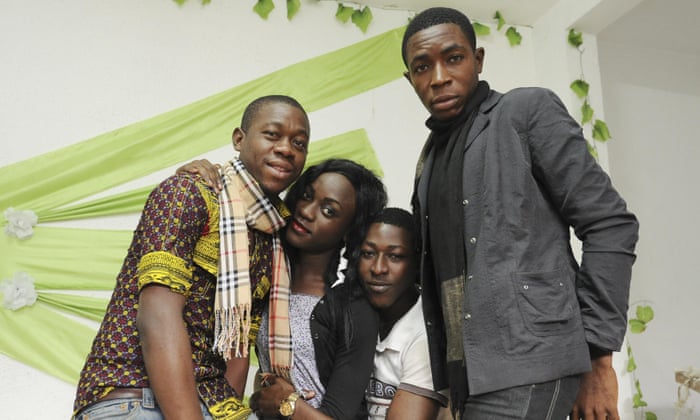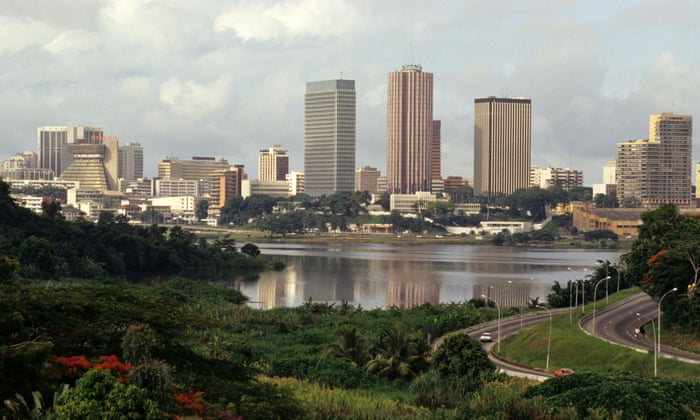A Brief Colonial History Of Ceylon(SriLanka)
Sri Lanka: One Island Two Nations
A Brief Colonial History Of Ceylon(SriLanka)
Sri Lanka: One Island Two Nations
(Full Story)
Search This Blog
Back to 500BC.
==========================
Thiranjala Weerasinghe sj.- One Island Two Nations
?????????????????????????????????????????????????Tuesday, January 31, 2017
Ivory Coast officials refuse to explain why two gay men were jailed
Acitivists say if indecency law was applied it would be first known instance of it being used to jail gay people
 Arthur,
Malika, David and Michel at the headquarters of Alternative Côte
d’Ivoire, an NGO defending LGBT rights in Abidjan. Photograph: Sia
Kambou/AFP/Getty
Arthur,
Malika, David and Michel at the headquarters of Alternative Côte
d’Ivoire, an NGO defending LGBT rights in Abidjan. Photograph: Sia
Kambou/AFP/Getty
Robbie Corey-Boulet in Sassandra, Ivory Coast-Thursday 26 January 2017
 Authorities in the Ivory Coast have
refused to explain why two gay men were arrested and jailed in a
country that does not criminalise same-sex acts, and is widely regarded
as a beacon of tolerance for sexual minorities.
Authorities in the Ivory Coast have
refused to explain why two gay men were arrested and jailed in a
country that does not criminalise same-sex acts, and is widely regarded
as a beacon of tolerance for sexual minorities.
Yann, 31, and Abdoul, 19, are openly gay but deny any romantic
relationship. They were arrested in October in a village in southwestern
Ivory Coast, apparently for “public indecency”.
Though prosecutors have declined
to confirm the charge against them, activists say if the indecency law
was used it would be the first known instance of the provision being
used to jail gay people in the country.
Graeme Reid, director of the LGBT rights programme
at Human Rights Watch, said: “A vague law, arbitrary arrests and an
unexplained conviction: this is completely contrary to the rule of law.
“The government needs to come clean and offer an explanation to these
two young men who have spent three months in jail for no apparent
reason.”
In an interview at the Sassandra prison two weeks before their release
on Wednesday, Yann said the case had upended his life and prevented him
from caring for his elderly mother.
“I am the only son of my mother. My father is dead, so it’s me who takes
care of her. But because of my nature, I am stuck here and I can’t take
care of her,” he said.
“We were convicted in an unjust manner. If there is no law that that
condemns it, I don’t understand how we could have been convicted.”
The case highlights the limited geographic reach of many gay rights
groups in the region. In Ivory Coast and neighbouring countries, most
activism takes place in major cities and there is often little contact
with more remote areas.
In Cameroon, where activists have long documented the government’s
rigorous application of its anti-gay law, local groups still have only a
faint idea of what goes on outside Douala and Yaoundé.
This divide is reinforced by the fact that sexual minorities in rural
areas can feel alienated by their urban counterparts’ use of western
campaign tactics and terminology, such as the term LGBT.
News of the Sassandra conviction only reached activists in Abidjan,
Ivory Coast’s largest city and commercial centre, after a local press
agency ran a story about it in November. By that point, the conviction
had already been handed down.
By that time, Yann and Abdoul, who had no lawyer at the trial, had
decided to forgo an appeal, fearing the process would extend well beyond
their three-month sentence.
 Abidjan, Ivory Coast. Many same-sex rights groups are located in the country’s cities. Photograph: Alamy
Abidjan, Ivory Coast. Many same-sex rights groups are located in the country’s cities. Photograph: Alamy
Local activists, who have limited funding, could afford to make the
eight-hour road trip to Sassandra only once during the men’s three-month
incarceration, meaning the pair were largely left to fend for
themselves in the prison system.
During the interview two weeks ago, guards blocked a
reporter from entering Sassandra prison, and Yann and Abdoul said they
were crammed into small cells with 80 other inmates. A tally on a
chalkboard near the prison entrance said 485 inmates were at the
facility, well over its official capacity of 300.
Now that they have been released, the pair plan to go to Abidjan to try
to rebuild their lives. But while the city is often viewed by gay west
Africans as a relative haven, with an impressive network of gay bars and
drag shows, security is hardly guaranteed.
There is no legal protection for sexual minorities, and incidents of
discrimination including physical assaults are common, activists say.
Last year, several gay men were beaten and forced to leave their homes
after the US embassy in Abidjan posted a photo of them signing a
condolence book for victims of the nightclub shooting in Orlando, Florida.
ADO Jr, president of Lesbian Life Association, a local group closely
following the case, said the Sassandra incident had also
receivedsensationalist coverage in Ivorian newspapers, potentially
endangering Yann and Abdoul.
One article, in the Soir Info, contained fabricated quotes purportedly from the two men that they had sex in public.
“This case caused a lot of buzz here,” ADO Jr said, “so they might feel they need to leave the country.”
